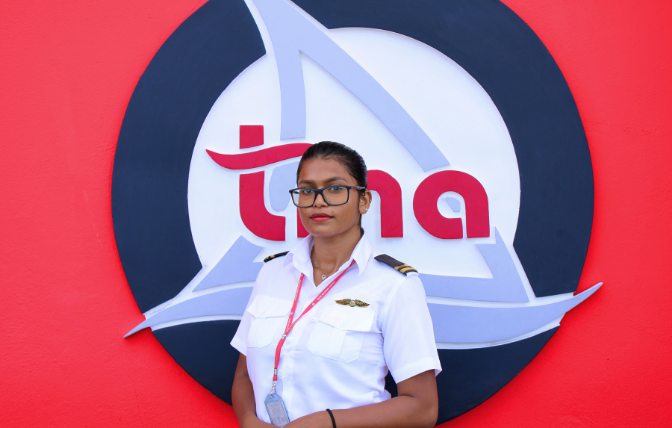

On the occasion of International Women’s Day, Travel Trade Maldives spoke with local women at the forefront of the Maldivian hospitality industry. Their contribution is magnitude in elevating the tourism experience, reshaping the industry for future leaders, and ensuring gender equality today for a sustainable tomorrow.
We sat down with Hawwa Nasra, First Officer at Trans Maldivian Airways to delve into her career and the challenges she faced. TMA is currently nearing a fleet of 60 aircraft and currently operates to over 80 resorts across 14 atolls. More than 300 TMA flights take to the Maldivian skies every single day, totaling more than 100,000 trips per year.
Hello. My Name is Nasra. I have been working as a First Officer at TMA for the past year.
I have always had an interest in the aviation industry and to one day become a Pilot since an early age. I would be very fascinated when I see planes passing by. But I was hesitant to pursue it at first, I didn’t think I could do it since I was a girl. As a kid, I didn’t have the courage to dream that big.
I wanted to explore the field of aviation after my A-Levels, so I joined Villa Air, Fly Me as a Flight Attendant. This was an excellent stepping stone into the industry. Straight out of school, going into this job was very eye-opening. I went through multiple trainings and familiarization and worked as an Assist Crew and as an In-Flight Supervisor. It gave me a general idea of how the industry works in the Maldives. It made me realize that I did indeed want to become a pilot.
After two years at Fly Me, I joined flying school to pursue my dream career as a Pilot.

It’s very exciting. I get to meet a lot of different people on a daily basis. I get to work with different people as well and have met great mentors. I was in the cabin before, and now in the cockpit. The scope of work is very different, but at the end of the day, we work towards the same goal- the safety of the flight and our guests.
My day starts at 4 am and I would report to work by 5 am. The first thing would be to check the assigned aircraft, remove the night ropes, pump the floats, do a walk around with the Captain, see if the aircraft is fit to fly. We are airborne at the first light of day.
A typical day consists of back-to-back flights from sunrise to sunset. We would do multiple sectors a day. We have days where we have day-shuts and we will spend a few hours at the resort, maybe go for a swim, ride a bicycle at the island, grab lunch, things like that. If we have early morning departures, we stay overnight at the resort, or we’re back in the base.
Every day and every flight brings new experiences. I really do enjoy the barefoot, laid-back lifestyle, and the fact that I don’t have to wear a tie.
The views, I could never get tired of the views. Catching rainbows and sunsets never gets old. The thrill of flying is always exciting. When operating on floats, every take-off and every landing is different. Water conditions, the tide, the location of the platforms, and working with different Captains each bring a different experience. No two flights are the same. The runway and the docking facilities are ever-changing.
The best part about working at TMA specifically is how encouraging the seniors are. They don’t look at you differently because you’re a girl. They are incredibly supportive and pushes you to be the best version of yourself. At TMA, we get to fly a lot and build our hours and practice manual flying. It’s a great place to develop our skills, and just for the experience alone as well!

I consider being a part of the biggest seaplane operator in the world as one of my biggest achievements.
The job is physically challenging, comes with long hours and some heavy lifting. But it is worth it in the end. I am very passionate about what I do, and work doesn’t feel like work. I really enjoy it.
Most challenges that we face are almost entirely based on societal perceptions. Our society still sees this profession as a man’s job. Which puts a lot of pressure on us; you tell yourself that you need to work twice as hard to prove to yourself, and to the society that you are just as good as your male counterparts.
Perception change! People are aware of the need for gender equality through school, education. But their perceptions remain. The industry in general has matured enough over the years, but it is still a long way before people’s attitudes change.
When I was a Flight Attendant and told people that I wanted to become a Pilot, not many people took me seriously. I have had people tell me that it’s not a good career as a woman, especially if I wanted to build a family. Before joining TMA, people told me that it will be a very tiring job and I would not be able to take it.
To change people’s perceptions, I think we need more living role models. Shine a light on women who are out here challenging stereotypes and misconceptions, and acing it in their respective fields. Encourage the younger generations through example.

Motivate yourself to be the best you can be, and don’t allow preconceptions to prevent you from doing what you love!
The field of aviation and that of being a pilot is equally challenging and very rewarding as well. So don’t let anyone try to discourage you. If you have the passion, work hard, aim high and reach for the sky!